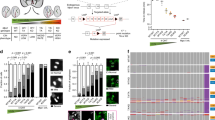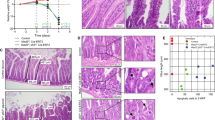Abstract
The mammalian homeobox transcription factor CDX2 has key roles in intestinal development and differentiation. Heterozygous Cdx2 mice develop one or two benign hamartomas in the proximal colon, whereas heterozygous ApcΔ716 mice develop numerous adenomatous polyps, mostly in the small intestine. Here we show that the colonic polyp number is about six times higher in Apc+/Δ716 Cdx2+/− compound mutant mice. Levels of both APC and CDX2 were significantly lower in the distal colon, which caused high anaphase bridge index (ABI) associated with a higher frequency of loss of heterozygosity (LOH) at Apc. In cultured rat intestinal epithelial and human colon cancer cell lines, suppression of CDX2 by antisense RNA caused marked increases in ABI and chromosomal aberrations. This was mediated by stimulation of the mTOR pathway, causing translational deregulation and G1-S acceleration, associated with low levels of p27 and activation of cyclin E–Cdk2. We obtained similar results in the colonic mucosa of Apc+/Δ716 Cdx2+/− compound mutant mice. Forced activation of mTOR through upstream regulator Akt also increased ABI in colon cancer cells. High ABI in all cell lines was suppressed by mTOR inhibitors LY294002 and rapamycin. These results suggest that reduced expression of CDX2 is important in colon tumorigenesis through mTOR-mediated chromosomal instability.
This is a preview of subscription content, access via your institution
Access options
Subscribe to this journal
Receive 12 print issues and online access
$209.00 per year
only $17.42 per issue
Buy this article
- Purchase on Springer Link
- Instant access to full article PDF
Prices may be subject to local taxes which are calculated during checkout







Similar content being viewed by others
References
Mlodzik, M. & Gehring, W.J. Expression of the caudal gene in the germ line of Drosophila: formation of an RNA and protein gradient during early embryogenesis. Cell 48, 465–478 (1987).
Beck, F., Erler, T., Russell, A. & James, R. Expression of Cdx-2 in the mouse embryo and placenta: possible role in patterning of the extra-embryonic membranes. Dev. Dyn. 204, 219–227 (1995).
Traber, P.G. & Silberg, D.G. Intestine-specific gene transcription. Annu. Rev. Physiol. 58, 275–297 (1996).
Lorentz, O. et al. Key role of the Cdx2 homeobox gene in extracellular matrix-mediated intestinal cell differentiation. J. Cell Biol. 139, 1553–1565 (1997).
Chawengsaksophak, K., James, R., Hammond, V.E., Kontgen, F. & Beck, F. Homeosis and intestinal tumours in Cdx2 mutant mice. Nature 386, 84–87 (1997).
Tamai, Y. et al. Colonic hamartoma development by anomalous duplication in Cdx2 knockout mice. Cancer Res. 59, 2965–2970 (1999).
Ee, H.C., Erler, T., Bhathal, P.S., Young, G.P. & James, R.J. Cdx-2 homeodomain protein expression in human and rat colorectal adenoma and carcinoma. Am. J. Pathol. 147, 586–592 (1995).
Mallo, G.V. et al. Molecular cloning, sequencing and expression of the mRNA encoding human Cdx1 and Cdx2 homeobox. Down-regulation of Cdx1 and Cdx2 mRNA expression during colorectal carcinogenesis. Int. J. Cancer 74, 35–44 (1997).
da Costa, L.T. et al. CDX2 is mutated in a colorectal cancer with normal APC/β-catenin signaling. Oncogene 18, 5010–5014 (1999).
Hinoi, T. et al. Loss of CDX2 expression and microsatellite instability are prominent features of large cell minimally differentiated carcinomas of the colon. Am. J. Pathol. 159, 2239–2248 (2001).
Oshima, M. et al. Loss of Apc heterozygosity and abnormal tissue building in nascent intestinal polyps in mice carrying a truncation Apc gene. Proc. Natl. Acad. Sci. USA 92, 4482–4486 (1995).
Oshima, H., Oshima, M., Kobayashi, M., Tsutsumi, M. & Taketo, M.M. Morphological and molecular processes of polyp formation in ApcΔ716 knockout mice. Cancer Res. 57, 1644–1649 (1997).
Haigis, K.M., Caya, J.G., Reichelderfer, M. & Dove, W.F. Intestinal adenomas can develop with a stable karyotype and stable microsatellites. Proc. Natl. Acad. Sci. USA 99, 8927–8931 (2002).
Haigis, K.M. & Dove, W.F. A Robertsonian translocation suppresses a somatic recombination pathway to loss of heterozygosity. Nat. Genet. 33, 33–39 (2003).
Rudolph, K.L., Millard, M., Bosenberg, M.W. & DePinho, R.A. Telomere dysfunction and evolution of intestinal carcinoma in mice and humans. Nat. Genet. 28, 155–159 (2001).
Luo, G. et al. Cancer predisposition caused by elevated mitotic recombination in Bloom mice. Nat. Genet. 26, 424–429 (2000).
Gisselsson, D. et al. Chromosomal breakage-fusion-bridge events cause genetic intratumor heterogeneity. Proc. Natl. Acad. Sci. USA 97, 5357–5362 (2000).
Fodde, R. et al. Mutations in the APC tumour suppressor gene cause chromosomal instability. Nat. Cell Biol. 3, 433–438 (2001).
Kaplan, K.B. et al. A role for the adenomatous polyposis coli protein in chromosome segregation. Nat. Cell Biol. 3, 429–432 (2001).
Homfray, T.F.R. et al. Defects in mismatch repair occur after APC mutations in the pathogenesis of sporadic colorectal tumors. Hum. Mutat. 11, 114–120 (1998).
Jones, S.M. & Kazlauskas, A. Growth-factor-dependent mitogenesis requires two distinct phases of signaling. Nat. Cell Biol. 3, 165–172 (2001).
Dufner, A. & Thomas, G. Ribosomal S6 kinase signaling and the control of translation. Exp. Cell Res. 253, 100–109 (1999).
Groden, J. et al. Response of colon cancer cell lines to the introduction of APC, a colon-specific tumor suppressor gene. Cancer Res. 55, 1531–1539 (1995).
Tetsu, O. & McCormick, F. β-Catenin regulates expression of cyclin D1 in colon carcinoma cells. Nature 398, 422–426 (1999).
Ohtsubo, M. & Roberts, J.M. Cyclin-dependent regulation of G1 in mammalian fibroblasts. Science 259, 1908–1912 (1993).
Spruck, C.H., Won, K.-A. & Reed, S.I. Deregulated cyclin E induces chromosome instability. Nature 401, 297–300 (1999).
Potten, C.S., Wilson, J.W. & Booth, C. Regulation and significance of apoptosis in the stem cells of the gastrointestinal epithelium. Stem Cells 15, 82–93 (1997).
Paulovich, A.G., Toczyski, D.P. & Hartwell, L.H. When checkpoints fail. Cell 88, 315–321 (1997).
Brunn, G.J. et al. Direct inhibition of the signaling functions of the mammalian target of rapamycin by the phosphoinositide 3-kinase inhibitors, wortmanin and LY294002. EMBO J. 15, 5256–5267 (1996).
Romanelli, A., Dreisbach, V.C. & Blenis, J. Characterization of phosphatidylinositol 3-Kinase-dependent phosphorylation of the hydrophobic motif site Thr389 in p70 S6 kinase 1. J. Biol. Chem. 277, 40281–40289 (2002).
Dobles, M., Liberal, V., Scott, M.L., Benezra, R. & Sorger, P.K. Chromosome missegregation and apoptosis in mice lacking the mitotic checkpoint protein Mad2. Cell 101, 635–645 (2000).
Zhou, P., Jiang, W., Weghorst, C.M. & Weinstein, I.B. Overexpression of cyclin D1 enhances gene amplification. Cancer Res. 56, 36–39 (1996).
Shih, I.-M. et al. Evidence that genetic instability occurs at an early stage of colorectal turmorigenesis. Cancer Res. 61, 818–822 (2001).
Willenbucher, R.F. et al. Genomic instability is an early event during the progression pathway of ulcerative-colitis-related neoplasia. Am. J. Pathol. 154, 1825–1830 (1999).
Sieber, O.M. et al. Analysis of chromosomal instability in human colorectal adenomas with two mutational hits at APC. Proc. Natl. Acad. Sci. 99, 16910–16915 (2002).
Hermsen, M. et al. Colorectal adenoma to carcinoma progression follows multiple pathways of chromosomal instability. Gastroenterology 123, 1109–1119 (2002).
Ried, T. et al. Comparative genomic hybridization reveals a specific pattern of chromosomal gains and losses during the genesis of colorectal tumors. Genes Chromosomes Cancer 15, 234–245 (1996).
Goel, A. et al. Characterization of sporadic colon cancer by patterns of genomic instability. Cancer Res. 63, 1608–1614 (2003).
Tischfield, J.A. & Shao, C. Somatic recombination redux. Nat. Genet. 33, 5–6 (2003).
Long, X. et al. TOR deficiency in C. elegans causes developmental arrest and intestinal atrophy by inhibition of mRNA translation. Curr. Biol. 12, 1448–1461 (2002).
McManus, E.J. & Alessi, D.R. TSC1-TSC2: a complex tale of PKB-mediated S6K regulation. Nat. Cell Biol. 4, E214–E216 (2002)
Tee, A.R., Manning, B.D., Roux, P.P., Cantley, L.C. & Blenis, J. Tuberous sclerosis complex gene products, tuberlin and hamartin, control mTOR signaling by acting as a GTPase-activating protein complex toward Rheb. Curr. Biol. 13, 1259–1268 (2003).
Harada, N. et al. Intestinal polyposis in mice with a dominant stable mutation of the β-catenin gene. EMBO J. 18, 5931–5942 (1999).
Seno, H. et al. CDX2 expression in the stomach with intestinal metaplasia and intestinal-type cancer: Prognostic implications. Int. J. Oncology 21, 769–774 (2002).
Nakayama, K. et al. Mice lacking p27Kip1 display increased body size, multiple organ hyperplasia, retinal dysplasia, and pituitary tumors. Cell 85, 707–720 (1996).
Chen, T.R., Dorotinsky, C.S., McGuire, L.J., Macy, M.L. & Hay, R.J. DLD-1 and HCT-15 cell lines derived separately from colorectal carcinomas have totally different chromosomal changes but the same genetic origin. Cancer Genet. Cytogenet. 81, 103–108 (1995).
Quaroni, A., Wands, J., Trelstad, R.L. & Isselbacher, K.J. Epithelioid cell cultures from rat small intestine. Characterization by morphologic and immunologic criteria. J. Cell Biol. 80, 248–265 (1979).
Ishikawa, T., Tamai, Y., Li, Q., Oshima, M. & Taketo, M.M. Requirement for tumor suppressor Apc in the morphogenesis of anterior and ventral mouse embryo. Dev. Biol. 253, 230–246 (2003).
Acknowledgements
We thank R. L. White and P. K. Vogt for valuable comments on the manuscript; F. Tamanoi for unpublished information; M. Sugai and A. Shimizu for help in flow cytometry; H. Seno and T. Ishikawa for antibody to mouse CDX2; J.-N. Freund for mouse Cdx2 cDNA; M. Tsujii for DLD-1 and IEC-6 cell lines; and M. Aoki, N. Harada, S. Yonehara, E. Nishida, T. Ishikawa and H. Miyoshi for help, suggestions and discussions. This work was supported by grants from Organization for Pharmaceutical Safety and Research and the Ministry of Education, Culture, Sports, Science, and Technology, Japan.
Author information
Authors and Affiliations
Corresponding author
Ethics declarations
Competing interests
The authors declare no competing financial interests.
Rights and permissions
About this article
Cite this article
Aoki, K., Tamai, Y., Horiike, S. et al. Colonic polyposis caused by mTOR-mediated chromosomal instability in Apc+/Δ716 Cdx2+/− compound mutant mice. Nat Genet 35, 323–330 (2003). https://doi.org/10.1038/ng1265
Received:
Accepted:
Published:
Issue Date:
DOI: https://doi.org/10.1038/ng1265
This article is cited by
-
NELF and PAF1C complexes are core transcriptional machineries controlling colon cancer stemness
Oncogene (2024)
-
The importance of habitat in the tumor-associated Pten, Mtor, and Akt gene expressions and chromosomal aberrations for wild rats
Biologia (2022)
-
The efficacy of aspirin and metformin combination therapy in patients with rectal aberrant crypt foci: a double-blinded randomized controlled trial
BMC Cancer (2020)
-
Intestinal region-specific Wnt signalling profiles reveal interrelation between cell identity and oncogenic pathway activity in cancer development
Cancer Cell International (2020)
-
Application of atomic force microscopy in cancer research
Journal of Nanobiotechnology (2018)



